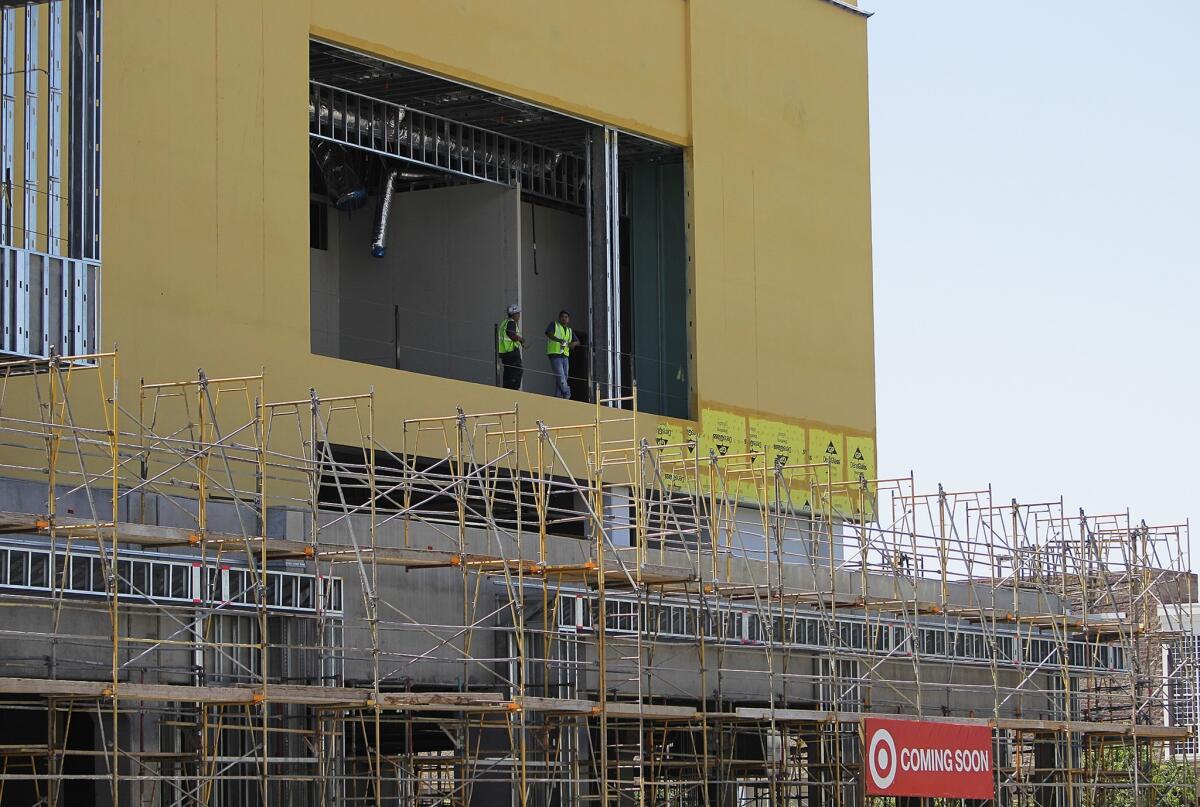Judge orders Target to stop building Hollywood shopping center

- Share via
A judge has called for retail giant Target Corp. to stop work on a partly built shopping center in Hollywood, handing a stinging setback to a project championed by Los Angeles Mayor Eric Garcetti.
Superior Court Judge Richard L. Fruin Jr. sided with two community groups who said in separate lawsuits that the City Council should not have allowed Target to build a 74-foot-tall structure in a location where such projects cannot exceed 35 feet.
In a related order issued last week, the court said the council must invalidate permits for the project and halt “all construction activities.”
Rob Wilcox, spokesman for City Atty. Mike Feuer, said city lawyers are still trying to determine “what further work, if any, can be done” at the Target site.
But attorney Robert P. Silverstein, who represents one of the two plaintiffs, said the construction at Sunset Boulevard and Western Avenue should have been halted a week ago. He is now seeking to have the city held in contempt of court for failing to issue a stop-work order.
“The judgment is clear,” said Silverstein, who represents the La Mirada Avenue Neighborhood Assn., one of the two groups that sued. “All construction must cease.”
In Hollywood, where the size and scale of new development is frequently a hot-button issue, critics of the Target project have warned that it would lead other developers to seek similar exemptions from the city’s height rules.
Target’s lawyers, in turn, said in court documents that they pursued a larger project specifically at the request of Garcetti — then a councilman representing Hollywood — who wanted more stores, restaurants and a pedestrian-friendly plaza.
Last week, Target asked the 2nd District Court of Appeal to ensure that work may proceed at the shopping center, which already has a foundation, walls and a roof. If the company’s request is denied, dozens of construction workers at the job site will suffer, the company said in its filing.
“Millions of dollars in investment will be stopped,” wrote Target’s lawyer, Richard Schulman. “And any delays will postpone, or worse, the hiring of a couple hundred people and millions of dollars in sales tax revenue for the city.”
The legal skirmish comes less than a year after the city was dealt a legal defeat on another Hollywood planning matter. In December, a judge struck down the city’s new Hollywood Community Plan, which sought to allow taller buildings near transit routes. Officials are now attempting to comply with that judge’s order.
Silverstein said La Mirada wants Target to tear down its project and build a store that stays within the 35-foot height limit required by the city’s Vermont/Western Station Neighborhood Area Plan, a package of zoning rules for part of Hollywood.
Target, said Silverstein, proceeded at its own risk after receiving ample warnings about a legal challenge.
“Nobody that I represent ever opposed a Target store,” Silverstein said. “What they opposed was blowing the lid off the height and the parking and the other structural requirements that are supposed to … guide development for the future of Hollywood.”
Wilcox, the city attorney’s spokesman, described La Mirada’s effort to have the city found in contempt of court as “utterly without merit.”
Meanwhile, Target said it has already asked city officials to rewrite portions of the Vermont/Western zoning plan that were at issue in the judge’s decision. Once that law is amended, the ruling against Target will be “moot,” Target’s attorney said in a court filing.
The City Council first approved the Target shopping center in 2010, drawing a lawsuit from critics who said the project lacked an environmental impact report. Weeks later, Target withdrew its application and agreed to prepare a more extensive environmental review.
The project was approved again in 2012. La Mirada and a second group, Citizens Coalition Los Angeles, responded with new lawsuits objecting to the council’s decision to spare Target from having to comply with rules dealing with building height, parking spaces, window size and other design concepts.
In their decision, lawmakers said Target would have faced an “unnecessary hardship” had it been forced to comply with the zoning plan. They also found that “exceptional circumstances” required that Target receive some exceptions to city rules.
In his ruling, Fruin said Target could have complied with the city’s height rules had it constructed an underground parking garage — a move that would have added at least $5 million to the project’s cost. Fruin also pointed to a 2012 letter sent by Target’s attorney, stating that the company originally considered a design that would have mostly complied with the city’s zoning requirements.
In that letter, Target lawyer Bill Delvac said the company changed plans in response to Garcetti and “key community stakeholders” who wanted the development to be more pedestrian friendly and “conform to good planning principles.” In response, the company proposed a three-story shopping center with Target on the third floor and other shops and restaurants on the ground floor.
Garcetti spokeswoman Marie Lloyd had no comment on the judge’s ruling, saying the mayor wants the shopping center site to be “revitalized with a mix of retail, restaurants and pedestrian-friendly features, including larger retail that creates jobs.”
In his order, Fruin said the desire to create a “lively shopping area” is not enough reason to exempt Target from the height limits.
Doug Haines, who belongs to the La Mirada group that sued, said Garcetti helped design the project that drew community opposition.
Target’s representatives “were told by Garcetti and his staff that they want height and density on Sunset Boulevard,” Haines said. “So they came up with this Frankenstein building that everyone hates.”
[email protected]
Twitter: @DavidZahniser
More to Read
Sign up for Essential California
The most important California stories and recommendations in your inbox every morning.
You may occasionally receive promotional content from the Los Angeles Times.











